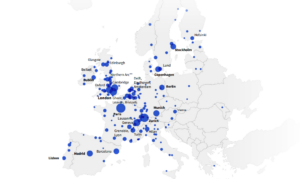Snowden railed against CBDCs: “Perversion of the cryptocurrency”

NSA whistleblower Edward Snowden has developed into a strong voice in exile for privacy and against state surveillance in the digital age. In his new blog / newsletter on Substack he is currently devoting himself to the topic of crypto assets – and in particular so-called CBDCs. These are Central Bank Digital Currencies, i.e. state digital currencies.
And Snowden doesn’t think that’s particularly great. CBDCs are not just digital dollars or euros, but rather the “bad twin” of cryptocurrencies. “CBDC is more of a perversion of cryptocurrency, or at least the founding principles and protocols of cryptocurrency – a crypto-fascist currency, an evil twin that entered the ledger on Opposite Day and is specifically designed to give its users basic ownership of their money refuse and use the state to mediate every transaction, ” writes Snowden.
Snowden is thus jumping on the bandwagon of critics who have been dealing with CBDCs for a long time. They fear that the state will act as the mediator and controller of every transaction, that the central banks will gain power over the private banks, and that the anonymity that exists with cash, for example, will completely disappear.
In addition, Snowden warns, central banks could charge the programmable digital money in the digital wallets with negative interest rates and thus induce citizens to spend the money that is becoming less and less fast – a control effect of monetary policy that should not be underestimated.
READ MORE: The European Central Bank greenlights digital euro
From China to Europe
This is exactly the debate that is currently going on in many countries. In China you can already see during the test runs with the digital yuan that the state banks know exactly who is carrying out which transaction to whom – and that the state institutions can analyze very precisely for which use cases (retail, Hospitality, payments for government services, donations) digital money is used.
In the EU, as reported by Trending Topics, the European Central Bank (ECB) has given the green light to the investigation phase of the digital euro. It also deals with the central question of how the privacy of users is secured when using the e-euro. According to the ECB, there are basically two directions in which the e-euro can be developed.
“Two approaches are conceivable for the digital euro, one with intermediaries who are interposed to process the payment, and one without intermediaries.
If we develop a digital euro that does not require a central bank or intermediary to process the individual payments, the digital euro would feel more like cash, but in digital form. You could even use the digital euro when you are not connected to the internet and your privacy and personal data would be better protected.
The other option would be a digital euro with intermediaries documenting the transaction. This would be done online and there would be greater potential for additional services that can be offered to the population and businesses. Opportunities for innovation and potential synergies with existing services would be created. For example, it would be easier to integrate the digital euro into electronic banking services and applications that are already available today. “
Fundamentally, the efforts of states are to be seen as a response to the advance of Bitcoin and other crypto assets, which often and gladly try to evade state influence. This not only applies to Bitcoin, but also to major projects such as Facebook’s Stablecoin Diem, which has become a thorn in the side of many governments.





























